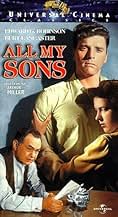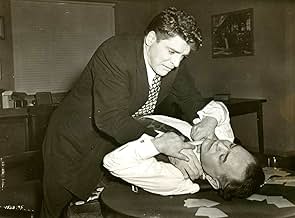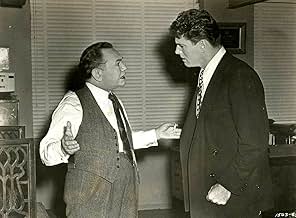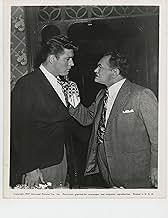Ajouter une intrigue dans votre langueDuring WW2, industrialist Joe Keller commits a crime and frames his business partner Herbert Deever but years later his sin comes back to haunt him when Joe's son plans to marry Deever's dau... Tout lireDuring WW2, industrialist Joe Keller commits a crime and frames his business partner Herbert Deever but years later his sin comes back to haunt him when Joe's son plans to marry Deever's daughter.During WW2, industrialist Joe Keller commits a crime and frames his business partner Herbert Deever but years later his sin comes back to haunt him when Joe's son plans to marry Deever's daughter.
- Réalisation
- Scénario
- Casting principal
- Récompenses
- 2 victoires et 2 nominations au total
- Frank Lubey
- (as Henry Morgan)
- Townswoman
- (non crédité)
- Jorgenson
- (non crédité)
- Mrs. Hamilton
- (non crédité)
- Bartender
- (non crédité)
- Workman
- (non crédité)
- Judge
- (non crédité)
- Halliday
- (non crédité)
- McGraw
- (non crédité)
Avis à la une
A terrific human guilt drama that reflects family pressure and a long-living conscience. Irving Reis's family drama is neither entertaining nor strained, but quite suspenseful. The idea of keeping the mystery unwrapped till the end was certainly new for family dramas back then, or is even today. Also, World War reference and the corporate business culture during the war period fit perfectly here. Joe Keller had been accused of murdering army officers due to a faulty shipment years ago. The court and juries acquitted him and grabbed his business partner, Herb. Now, years later, Herb's daughter and Joe's son want to get married, but Herb's son learns the truth and wants his sister to stay away from Joe and his family. The girl was previously engaged to Joe's first son, who disappeared years ago, and that's why the other son can't marry her as the mother is still hoping for that son to return home. What is the truth? Well, I guess you know it by now, or you can sense it halfway while watching the movie, but that doesn't kill the suspense at all. It eventually becomes more interesting because of its consequences. Things are predictable, but never boring. Every character offers something different. Every character has a problem of its own, and that's how they get involved with each other and then find a solution. The film has terrific speed, and the screenplay makes sure you don't get away from your sofa. The tension feels real and intriguing. Edward G. Robinson is fantastic as the man of the family, the man with the guilt, and the man with the responsibility. I couldn't have imagined him and Burt Lancaster playing father and son in the 40s, but it came out so well. Louisa Horton is another star performer, along with Mady Christians. I shall give full marks to Irving Reis for keeping me hooked and gripped for 95 minutes with the drama that I thought couldn't hold me. Reis makes sure the engagement gets an intellectual and burning ending, so don't miss it.
RATING - 7/10*
By - #samthebestest.
Seems that during WWII, he and his partner (FRANK CONROY) were pressured to finish making cylinder parts for airplanes on the government's tight schedule and knowingly sent defective parts which caused the death of twenty-one pilots when their planes went down. Robinson has been hiding the truth from himself and his neighbors ever since, concerned only with making a decent living for himself and his family in suburban America.
Conflicts arise when others around him begin to question his role in the crime that sent his partner to jail. The son of the jailed partner, played in rather stiff fashion by HOWARD DUFF, is unforgiving when he realizes Robinson shared the guilt with his father and yet let his father take the blame for the incident. Lancaster, too, and his girlfriend (LOUISA HORTON) who happens to be Duff's sister, also bring the conflicts into the open when they start asking for answers and probing for the truth. Horton is rather colorless in what is meant to be a sympathetic role and spent her remaining years in TV roles.
But it's EDWARD G. ROBINSON who makes the biggest impression as the father, proud of his achievements and obviously in denial until his son, Lancaster, makes him realize why his other son never returned from the war--which leads to a tragic ending.
Summing up: Somber drama never quite overcomes its stage origins but it's still powerful stuff.
Trivia note: The only implausible factor in the casting--the physical impossibility of BURT LANCASTER as Robinson's son, when he bears no physical resemblance whatsoever to Eddie--nor Mady Christians for that matter!
Edward G. Robinson gave us an outstanding performance as the conflicted individual, who did this for his own selfish-interests only to escape prosecution but to see his partner jailed.
This is a story of intense inter-family conflicts. The partner's daughter was to be married to Joe's (Robinson's) son Larry in the film. The picture begins with the fact that Larry is missing in action. Ann, played by Louisa Horton, is now becoming engaged to Joe's other son, Chris, played with marvelous insight by a young Burt Lancaster.
Mady Christians is also a standout as Joe's devoted wife, who herself is in denial that Larry is probably dead and knowing full well what her husband did was wrong.
This is a terrific film dealing with moral conflict and the ultimate tragic resolution to it.
You have to wonder what Edward G. Robinson had to do to be nominated for an academy award.
This is Arthur Miller at his best writing. A truly American classic.
Here the opening scenes are middle class and almost mundane and so post war. A son (Burt Lancaster) has returned from war and is planning to marry the girl of his dead brother, killed in the war. The living son's mother can't deal with the fact that her dead son is indeed dead - he died on an aerial mission and his body was never recovered. And thus she is not very supportive of this prospective union.
But this film turns out not to be about war and remembrance and the new middle class at all. Instead it is about a deed past done, and apparently the perpetrator has gotten away with it, and only as the film wears on are all of the secrets revealed, as well as the real reason the mother cannot accept her son's death.
Edward G. Robinson is terrific as the father who is living the American dream after being set out on the sidewalks by his own family since the age of ten. Lancaster with his beaming smile and his head full of bushy hair would look at home in a collegiate letter jacket, and this is a good early showcase for his talents. Harry Morgan appears in a minor role as one of the fathers of the ongoing baby boom.
I haven't said much here about what is really the conflict in this film, because I don't want to give anything away. However, it is a great film about moral conflict versus friend and family and even patriotic obligations, and it is a shame it is so obscure.
They were both guilty....
It's a wonderful story and very well performed and written, but that fact remains to be discussed.
Le saviez-vous
- AnecdotesThe original Broadway production of "All My Sons" opened at the Coronet Theater in New York on January 29, 1947. It ran for 328 performances, and won the 1947 Best Play Tony Award for author Arthur Miller. His original script was used as the basis for this movie's screenplay.
- GaffesWhen Joe comes out of the house upon Annie's arrival, he comes down the front steps and walks into the yard with his arms raised. In the next instant, he's back at the steps and his arms are down.
- Citations
Jim Bayliss: Put her to bed, Joe. Both of you go to bed. Staying up won't help; sleep will. Sleep's a wonderful thing, the best thing about living.
- ConnexionsFeatured in Film Preview: Épisode #1.1 (1966)
Meilleurs choix
- How long is All My Sons?Alimenté par Alexa
Détails
- Date de sortie
- Pays d’origine
- Sites officiels
- Langue
- Aussi connu sous le nom de
- All My Sons
- Lieux de tournage
- Santa Rosa, Californie, États-Unis(the Grace home on McDonald Avenue)
- Société de production
- Voir plus de crédits d'entreprise sur IMDbPro
- Durée
- 1h 34min(94 min)
- Couleur
- Rapport de forme
- 1.37 : 1


































